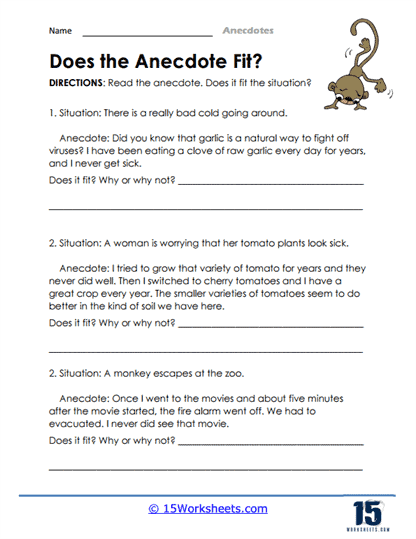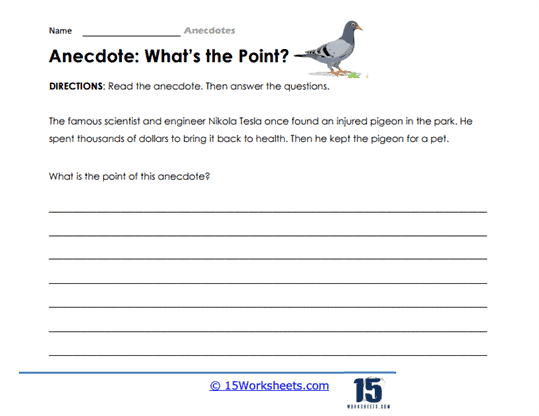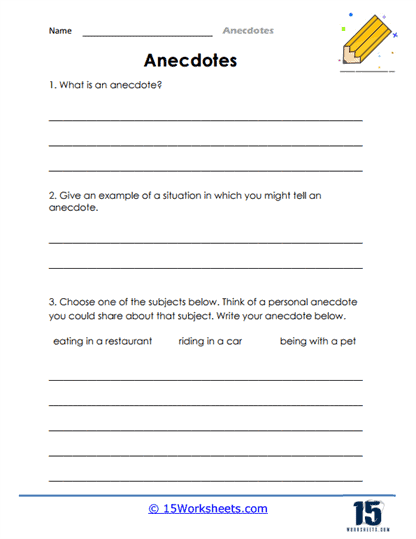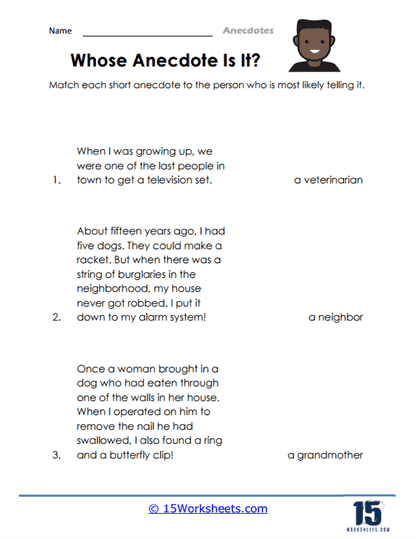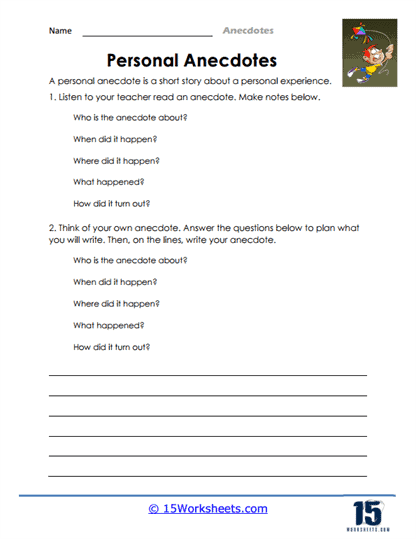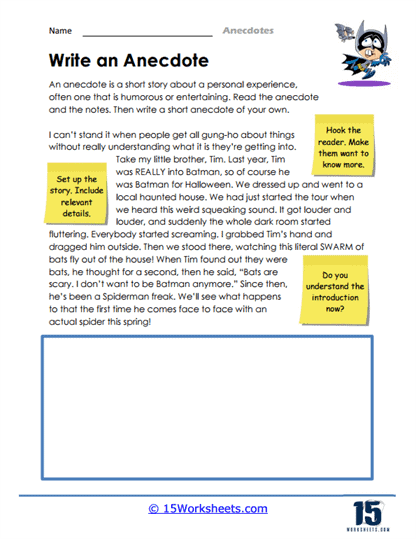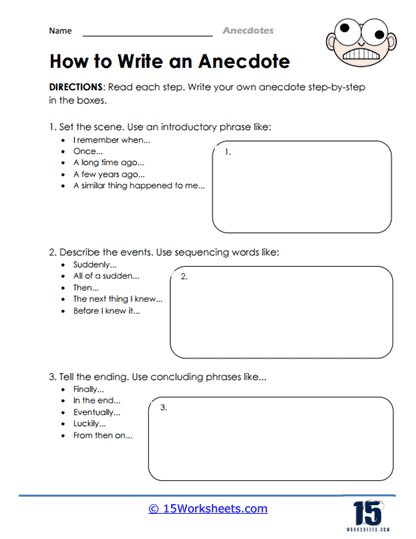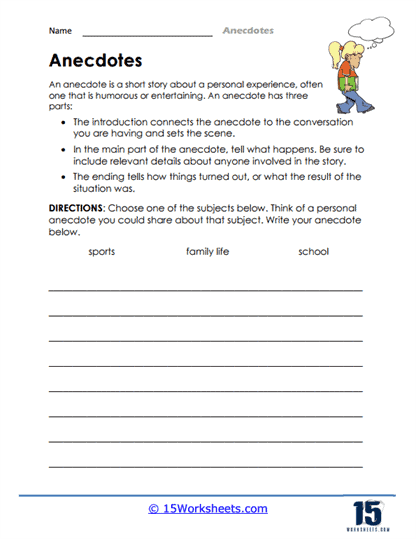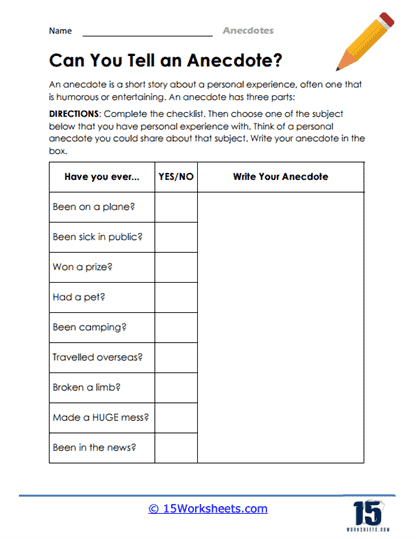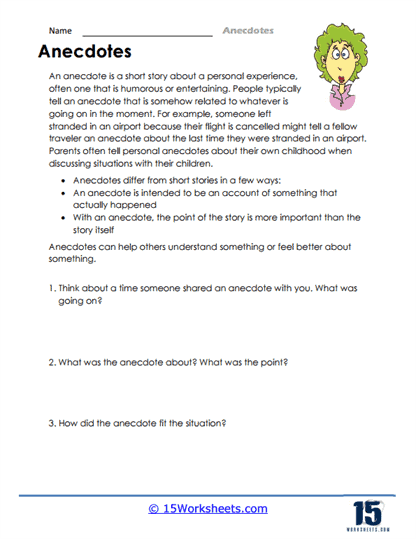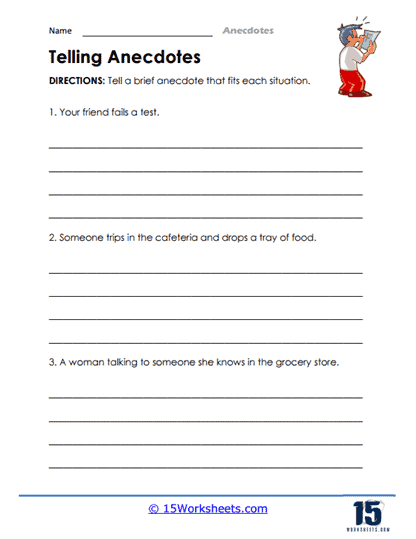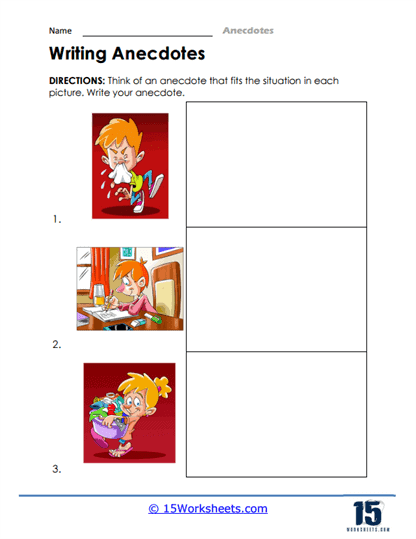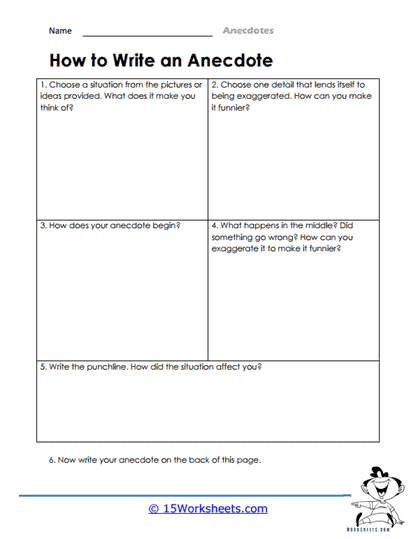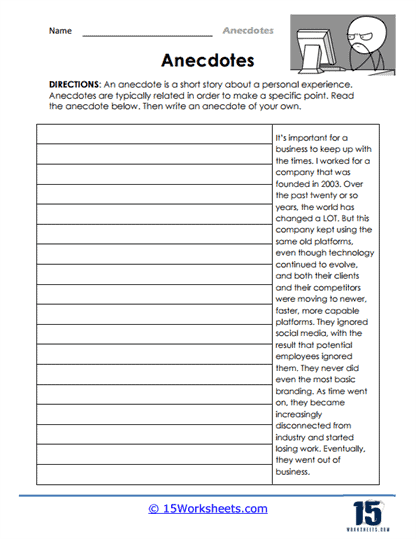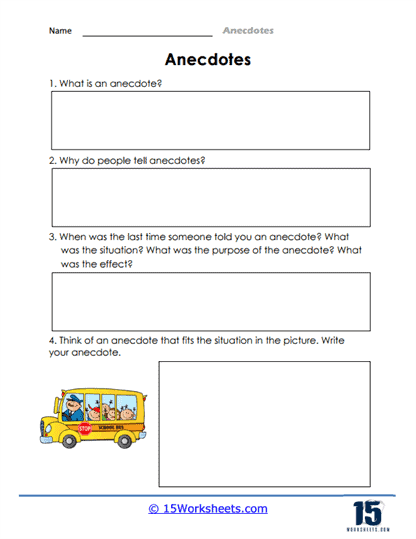Anecdotes Worksheets
All About These 15 Worksheets
Anecdotes, brief and often amusing stories about real events or individuals, are potent tools for communication, persuasion, and connection. Understanding the art of crafting and appreciating anecdotes is not just about storytelling; it’s about honing valuable skills in narrative, critical thinking, and effective communication. In a world where the ability to engage an audience and convey ideas concisely is paramount, students must develop the ability to recognize, create, and appreciate anecdotes.
To empower students with the art of anecdotes and its myriad applications, we proudly present a collection of 15 worksheets on Anecdotes. These worksheets are meticulously designed to provide students with structured and engaging opportunities to explore, practice, and master the art of anecdotes.
These are activities that help you understand and practice using anecdotes in your writing. An anecdote is a short and interesting story or personal experience that you can share to make your writing more engaging.
In these worksheets, you’ll see examples of anecdotes or prompts that ask you to come up with your own stories. You’ll learn how to think about special moments or experiences from your life and turn them into short stories that you can use in your writing.
The goal of the worksheets is to help you become a better storyteller and make your writing more exciting. Anecdotes can capture the reader’s attention, make your writing more relatable, or help explain your ideas with examples from real life.
Why Do Authors Use Anecdotes As A Literary Device?
Authors use anecdotes as a literary device for several reasons. Here are five examples:
Engaging the Reader
Anecdotes capture the reader’s attention and create a personal connection. By sharing relatable or interesting stories, authors can draw readers into their writing and make it more engaging from the start. For example, in Roald Dahl’s book “Matilda,” the author begins with an anecdote about a five-year-old boy who is mistaken for being incredibly bright, immediately captivating the reader’s interest.
Providing Examples and Evidence
Anecdotes can be used to illustrate and support arguments or ideas. By sharing real-life experiences, authors can provide concrete examples that clarify and reinforce their points. In Malcolm Gladwell’s book “Outliers,” he includes anecdotes of successful individuals and their backgrounds to support his thesis about the role of opportunity and practice in achieving exceptional outcomes.
Adding Emotional Impact
Anecdotes evoke emotions and make writing more memorable. By sharing personal stories or experiences, authors can elicit empathy, excitement, or other emotional responses from readers. For instance, in Harper Lee’s novel “To Kill a Mockingbird,” the character Scout narrates anecdotes from her childhood, allowing readers to experience the story through her innocent and heartfelt perspective.
Developing Characters
Anecdotes can be used to reveal insights into a character’s personality, motivations, or background. By recounting specific incidents, authors provide a glimpse into the character’s life and enhance their development. In J.R.R. Tolkien’s “The Lord of the Rings,” the character Gandalf shares anecdotes about his adventures and encounters, deepening the reader’s understanding of his wisdom, experiences, and role in the story.
Enhancing Descriptions
Anecdotes can be used to vividly describe events, places, or situations. By recounting specific details and sensory experiences, authors bring their writing to life and allow readers to visualize and immerse themselves in the story. In Ernest Hemingway’s short story “Hills Like White Elephants,” the author uses anecdotes and dialogue to paint a rich picture of a tense conversation between two characters at a train station.
The Importance of Understanding Anecdotes For Students
Understanding anecdotes and their various forms is of great importance for several reasons:
- Effective Communication: Anecdotes are powerful tools for engaging audiences, making complex ideas relatable, and conveying messages persuasively.
- Critical Thinking: Analyzing anecdotes encourages students to think critically about the structure, tone, and impact of storytelling.
- Cultural Awareness: Anecdotes often carry cultural and social significance, helping students appreciate the richness of human experiences.
- Storytelling Skills: Proficiency in crafting anecdotes enhances students’ storytelling abilities, enabling them to captivate listeners and convey messages memorably.
Benefits Of These Anecdotes Worksheets
This collection of Anecdotes worksheets offers numerous advantages for students:
- Structured Learning: The worksheets are thoughtfully organized to provide students with a structured learning experience. They progress from basic anecdote concepts to more advanced narrative techniques, ensuring a comprehensive understanding.
- Engaging Activities: Each worksheet incorporates fun and interactive activities, including analyzing famous anecdotes, crafting personal stories, and interpreting literary anecdotes. These activities make learning about anecdotes enjoyable, keeping students motivated and interested.
- Versatility: These worksheets can be used in various educational settings, including language arts classes, creative writing workshops, and public speaking clubs. They are adaptable to students of different ages and proficiency levels.
- Enhanced Communication Skills: Proficiency in understanding and crafting anecdotes equips students with the skills to communicate effectively, engage audiences, and convey ideas persuasively.
- Critical Thinking: Analyzing anecdotes challenges students to think critically about storytelling techniques, message delivery, and audience engagement.
This collection of Anecdotes worksheets is a valuable resource for educators and parents committed to nurturing effective communication, critical thinking, and storytelling skills in students. Proficiency in recognizing, crafting, and appreciating anecdotes equips individuals with the tools to engage their audience, convey ideas persuasively, and appreciate the artistry of storytelling.
This collection is an investment in their future success, ensuring they have the storytelling skills to communicate with impact, captivate listeners, and connect with others on a deeper level. Explore these Anecdotes worksheets today, and watch your students become masterful storytellers who can unlock the treasures of anecdotes with skill and finesse.

